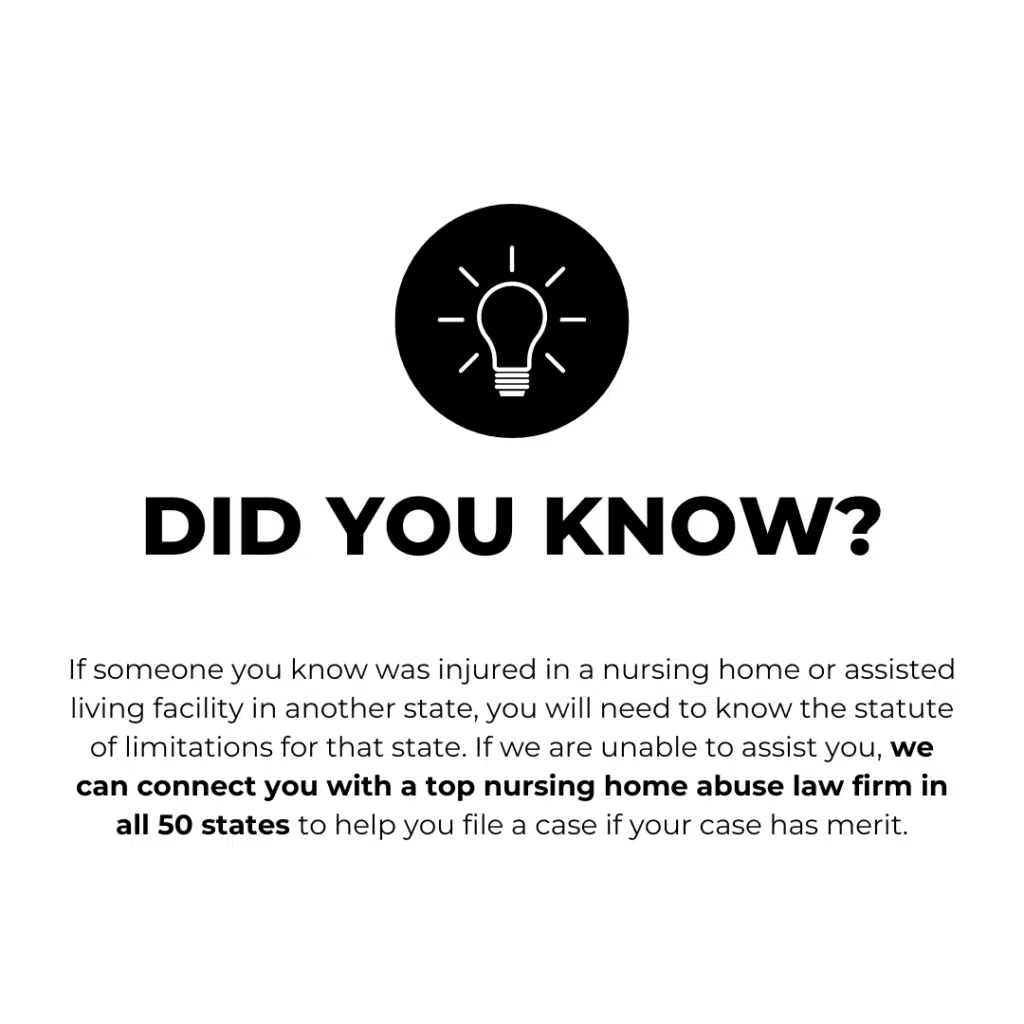
Nursing home abuse and neglect put vulnerable residents at serious risk, leading to malnutrition, dehydration, infections, and preventable injuries. When facilities fail to provide adequate care, residents suffer, and families are left feeling helpless. Lack of supervision, improper medical treatment, and unsafe conditions can result in devastating harm. Understanding the warning signs, knowing your legal rights, and holding negligent facilities accountable are crucial steps in protecting your loved ones. Learn how to take action and seek justice.
November 5, 2024
3 min
If you have arrived at this page, someone you know has likely been seriously injured or killed in a nursing home. You probably have a number of questions about whether you should contact a lawyer to investigate your circumstances. If you’ve come this far, hopefully you’ll go a little further and find the answers you need.
The statistics tell the story. In a study published by Studies in Health Technology and Informatics called Your Healthcare May Kill You: Medical Errors, medical errors are identified as the third leading cause of death in the United States. This is not a new statistic. Medical errors have remained the third leading cause of death for two decades. Worse yet, according to the study, less than 10% of medical errors are ever reported. According to a comprehensive study by Johns Hopkins University, a staggering number of injuries occur because of healthcare errors. 400,000 deaths are caused in the US each year because of medical errors. This study was limited to hospital care.
The statistics in nursing homes are much worse. In a single year, 25% of nursing homes are cited for causing serious injuries or death. Only 5% of the elderly live in nursing homes. Yet, more than 20% of all falls occur in nursing homes. Studies show that up to 27% of nursing home patients have been on the receiving end of medication errors. Nursing homes are supposed to keep their medication errors below 5%. Clearly, they are not only missing these guidelines, but no one is enforcing them.
The journal Medical Care reported the findings of a comprehensive study performed by the University of Chicago. The study investigated the accuracy of data reported by nursing homes. The study found that nursing homes only self-reported 59% bedsores that required hospitalizations. This is consistent with previous studies conducted by the University of Chicago. In the journal Health Services Research, the researchers reported that nursing homes only reported 57% of falls that occur in nursing homes.
What do these statistics tell us? They tell us that the healthcare industry is incapable of policing itself. Nursing homes do not self-report the harm they cause, and they have no incentive to do so. The 5 star rating system that is published on Medicare’s Nursing Home Compare website is one of the key resources that people look to when selecting a nursing home. The Quality Measure component–which is a major criteria–is based on self-reported information. We know this information is wildly inaccurate.
If the industry and government refuse to police the industry, then that responsibility is left to the rest of us ordinary people.
If the current process of self-reporting doesn’t work and creates a culture of silence and hiding, reform must come a different way. That is where lawsuits come in.
More than 70% of nursing homes are for-profit corporations. Sadly, for many nursing homes, the main goal is monetary profit and not patient care. More and more often, nursing home chains have taken massive loans from private equity firms. This has allowed them to expand their network of nursing homes at the expense of residents, and then cash out raking in millions of dollars in the process. It also allows people who have no experience in the healthcare field and are totally inept when it comes to caring for nursing home residents to take out risky loans and build nursing home empires. 11% of all nursing homes are owned by private equity firms.
For example, Atrium Health and Senior Living had been enriching itself for years before abruptly closing its doors at multiple facilities, forcing elderly residents out in the Wisconsin cold, many without coats, with nowhere to go, according to Politico. Atrium was allowed to take massive loans from private equity firms and then reinvest in new nursing homes. It also allowed them to siphon off the profits as it teetered on collapse and bills went unpaid. As the company collapsed, more than 10 million dollars were distributed to partners.
The nursing home industry is becoming increasingly financially motivated. Until there is recourse for their greed, nothing will change.
Unfortunately, nursing homes are for-profit corporations, and the only language they speak is the language of money. Cold hard cash. Regulatory and government reform does not change nursing homes or their owner’s motives. The nursing home industry has been heavily regulated since the late-1980’s, but other than a series of words on paper little has changed.
How do lawsuits make the system safer? Lawsuits take the power away from lenders, business insiders, lobbyists, and ineffectual government regulators and hand it back to the people. For nursing homes, juries are scary. Juries are a collection of people brought from the community to do what is right for the community. The only thing a jury can do is award money to the people nursing homes have harmed, and that’s the only thing nursing homes care about.
A large jury verdict resets the nursing home’s calculations. If a nursing home was able to siphon a million dollars in profits by understaffing a facility, then they are financially ahead, and they have every incentive to continue this business model. But, if a jury punishes them for understaffing the facility and causing the death of a resident, that calculation was no longer a financially wise one. If the jury returns a verdict for $50 million dollars, then that calculation was drastically wrong. Instead of generating more profits, they lost everything. This doesn’t affect just this nursing home, it changes the industry. Understaffing and poor care no longer means a larger bank roll, it means potential financial ruin.

Nursing homes and the healthcare industry as a whole are good at keeping bad information secret. As study after study has shown, nursing homes do not report medication errors, falls, or bedsores–flouting government regulations. The explanations they provide to families are often equally short of information. It is not uncommon for a family member to only learn of serious issues at the nursing home by hospital staff who are treating the conditions, when reviewing the death certificate or autopsy results, or when watching a video of the events.
In a lawsuit, nursing homes are forced to turnover evidence. They often resist with all their might, but the civil jury system gives lawyers the power to obtain documents and evidence that would otherwise be unavailable and to force corporate owners to sit for a deposition and provide sworn testimony.
Sometimes people are hesitant to contact a lawyer because of the time commitment involved. However, by and large, the work and effort are done by the law firm. Other than answering written questions, providing lawyers with information, giving a deposition, and potentially testifying at trial there is little that the client needs to do. That is not to say that a client cannot be more involved. They can certainly be as involved as they want. But, it is not a requirement.
Individuals claiming to be pro-Constitution and asking for a return to a limited government often claim to not like lawsuits. They should. Juries are the oldest and purest form of government in the United States.
The Massachusetts Bay Colony empaneled the first jury in the United States in 1635–more than 100 years before the Constitution was drafted. In the 1700s, juries were responsible for pushing back the Royalists. In 1765, colonial juries expressed their independence by refusing to indict leaders under the Stamp Act (1765) because there could not be taxation without representation. That same year, a jury refused to bring libel charges against the Boston Gazette for statements against the British. By the end of the Colonial Period, the jury system was an indispensable part of the government. Indeed, the framers of the Constitution ensured the right to a jury trial as one of the guaranteed rights that could not be taken away from the public in the Sixth Amendment.
The jury system was, and remains, an essential part of American independence and freedom from tyranny.
There is a myth that has been perpetuated by large corporations, malpractice insurers, and lobbyists that lawsuits increase the cost of health care and force healthcare facilities to shut down or leave the area. This myth has been given many names but the most common name is “tort reform.”
Tort reform has two goals: (1) make it more difficult for injured people to file lawsuits by limiting the time limit to do so and requiring complicated steps that must be taken before filing a lawsuit; and (2) limiting the amount of money that can be recovered called “damage caps.”
The reality is that in states where tort reform has occurred, insurance premiums did not go down. Instead, they continued to increase at steady rates. Who did these measures favor? They favored insurance companies who could continue to have a steady flow of income without having to pay claims when people were injured.
Likewise, there is no evidence that any doctors or healthcare companies left any states because of potential lawsuits. No statistics exist to prove this myth. This makes sense, of course, if we look at other industries. Does auto insurance or lawsuits cause people to stop owning cars and force auto manufacturers out of business? Has the shipping industry ground to a halt because long-haul trucking companies are required to carry large amounts of insurance and are sued when they do wrong? Of course not. And there are many more lawsuits for car accidents than there ever will be for nursing home abuse and neglect.
So, if your concern is that lawsuits will negatively impact the healthcare industry, they won’t. The opposite is true. They improve the healthcare system.
Disclaimer: This information is provided for informational purposes only. Nothing in this article should be construed as providing legal advice or the creation of an attorney client relationship. Laws are updated frequently and change from state to state. If you desire legal advice, you can contact Michael Hill Trial Law at www.protectseniors.com, send an email to info@protectseniors.com, call (800) 659-2712 to begin an investigation, or contact another attorney.